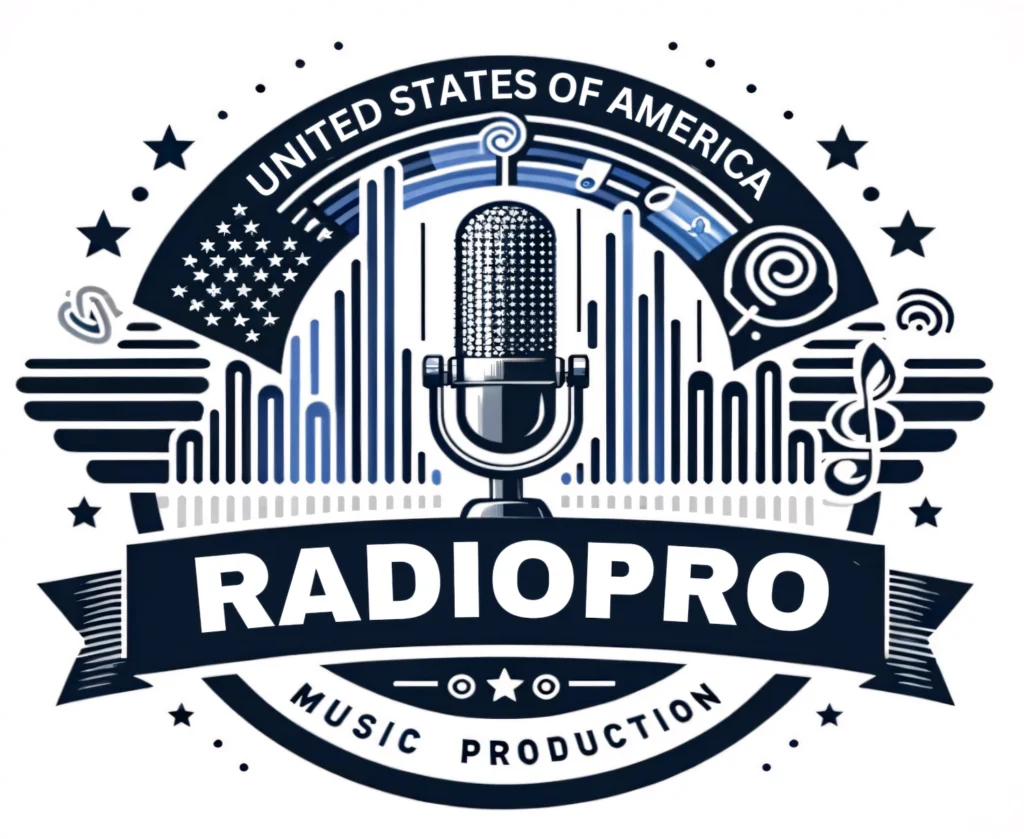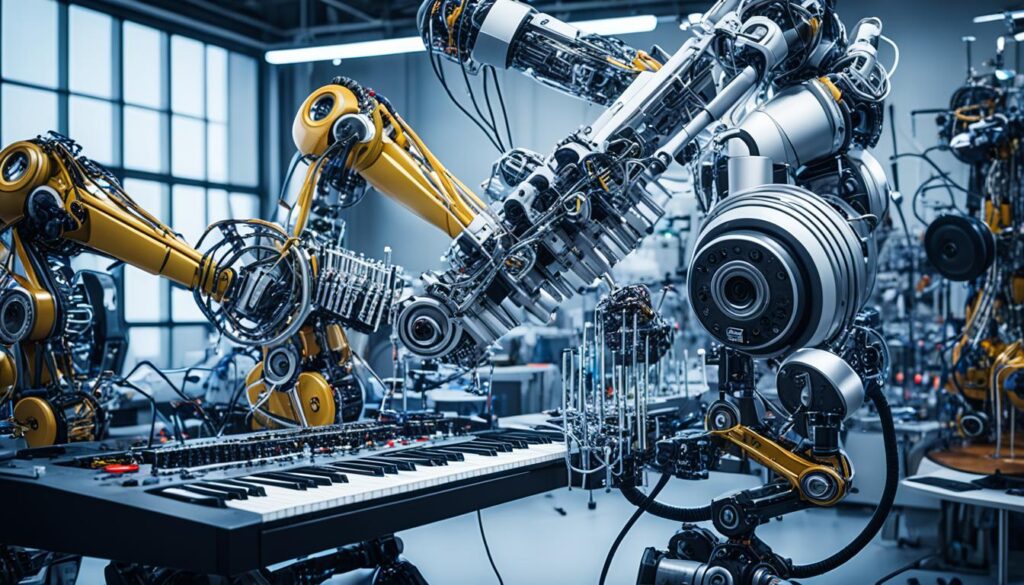By Yoshi Moon – CEO, RadioPro LLC
Nov 19, 2022
Artificial intelligence (AI) is revolutionizing the music industry, transforming its evolution in unprecedented ways. AI is reshaping how music is created, accessed, and monetized. AI music tools assist in composition, sound design, and mastering, enhancing the creative process for artists and producers. AI-driven personalization in streaming services provides customized experiences for listeners, increasing user engagement and satisfaction. Challenges include addressing copyright in AI-generated music and maintaining authenticity amidst automation. New business models leverage diverse income streams and AI-powered marketing for enhanced revenue generation. AI is at the forefront of the AI revolution, shaping its evolution and redefining the future of music.
Key Takeaways
- AI-driven technologies are transforming the music industry, revolutionizing music creation, access, and monetization.
- AI music tools enhance the creative process for artists and producers, assisting in composition, sound design, and mastering.
- AI-driven personalization in streaming services provides customized music experiences, increasing user engagement and satisfaction.
- Challenges include addressing copyright issues in AI-generated music and maintaining authenticity amidst automation.
- New business models leverage diverse income streams and AI-powered marketing for enhanced revenue generation.
The Onset of AI in Modern Music Production
The integration of artificial intelligence (AI) in modern music production has brought about a paradigm shift in the way artists and producers approach their craft. AI-powered tools and algorithms have become indispensable in various aspects of music production, including music composition, sound design, and mastering. These advancements in AI technology have democratized access to professional-grade tools and techniques, empowering artists of all levels to elevate their music.
AI composition tools are revolutionizing the creative process by assisting artists in generating melodic ideas, harmonies, and chord progressions. With deep learning music software, artists can explore new sonic territories and experiment with different musical styles, expanding the boundaries of their compositions. This automated music creation process not only saves time but also provides artists with fresh inspiration and novel musical directions.
Furthermore, AI-powered sound design tools have transformed the way producers shape the sonic aesthetic of their music. These tools recommend suitable options for desired sonic characteristics, allowing producers to achieve specific sounds and textures with ease. By leveraging deep learning algorithms, these tools analyze vast amounts of audio data to understand patterns and trends, producing tailor-made recommendations that align with the artist’s vision and intention.
The impact of AI in music production goes beyond composition and sound design. AI mastering tools play a critical role in optimizing the final sound of a production. By analyzing the sonic characteristics of reference tracks, AI mastering algorithms fine-tune the mix, applying a professional touch to achieve a polished and cohesive sound. This automated process enhances the quality and consistency of music productions, empowering artists to deliver their work at a professional level.
“AI in music production has transformed the way I express my creativity. The AI composition tools help me overcome writer’s block and generate musical ideas that I would have never thought of. It’s like having an AI collaborator that understands my musical style and pushes me to explore new territories.”
– Sarah Spencer, Music Producer
The inclusion of AI in modern music production has revolutionized the industry and created endless possibilities for artists and producers. However, it is important to strike a balance between the use of AI technology and preserving the human touch in music creation. While AI can enhance and accelerate the creative process, it should never replace human creativity and emotion.
Artists and producers should embrace AI as a powerful tool that complements their skills and allows them to push the boundaries of their creativity. By harnessing the capabilities of AI-powered music production tools, artists can explore new sonic landscapes, experiment with innovative techniques, and create music that resonates with audiences on a deeper level.
| Benefits of AI in Modern Music Production | Challenges and Considerations |
|---|---|
|
|
Empowering Artists with AI-Powered Music Production
AI-powered music production tools have transformed the way artists create and refine their music. By leveraging deep learning algorithms, these tools provide artists with endless possibilities for composition, sound design, and mastering. With AI’s assistance, artists can bring their musical visions to life with greater ease and efficiency. This integration of AI in modern music production marks a new era of creativity and innovation in the music industry.
AI-Driven Personalization in Music Streaming Services
AI-driven personalization has revolutionized the way we experience music through streaming services. With the help of advanced AI music technology and neural network music generation algorithms, streaming platforms can now create personalized music experiences for listeners.
Machine learning algorithms analyze vast amounts of user data, including music preferences, listening habits, and user feedback, to curate customized playlists and provide tailored music recommendations. This level of personalization enhances user engagement and satisfaction, giving listeners a sense of connection and a unique music experience.
But AI in music streaming services goes beyond simple recommendations. It takes into account various factors such as mood and activity to curate customized music experiences. Whether you’re feeling energized for a workout session or looking for calming music to help you unwind, AI-powered streaming platforms can create playlists that perfectly complement your current state.
This personalized approach benefits not just the listeners but also artists and labels. By leveraging AI music composer and neural network music generation, streaming platforms can help artists reach new and engaged audiences. For example, an up-and-coming artist can have their music featured on playlists that align with their genre and target audience. This exposure can lead to increased recognition and fanbase growth.
AI-driven personalization in music streaming services is transforming how we discover, explore, and connect with music. By utilizing the power of AI music technology and neural network music generation, streaming platforms can create highly tailored music experiences that resonate with listeners on a personal level.
Benefits of AI-Driven Personalization in Music Streaming Services
| Benefits | Description |
|---|---|
| Enhanced User Engagement | Personalized music experiences increase user engagement and keep listeners coming back for more. |
| Increased User Satisfaction | Customized playlists and tailored recommendations cater to individual preferences, enhancing overall listener satisfaction. |
| Discoverability for Artists | AI-powered platforms expose artists to new audiences, helping them gain recognition and expand their fanbase. |
| Opportunities for Music Collaboration | AI-driven platforms can connect artists with similar styles and interests, facilitating collaborations and creative partnerships. |
In summary, AI-driven personalization in music streaming services is revolutionizing the way we enjoy music. Through the use of AI music technology, neural network music generation, and advanced algorithms, streaming platforms can provide personalized music experiences that cater to individual preferences, leading to increased user engagement and satisfaction. Additionally, this technology opens up new opportunities for artists to reach a wider audience and collaborate with like-minded musicians.
Artificial Intelligence Impact on Music Creation and Distribution
Artificial intelligence has revolutionized the music industry, bringing forth a new era of creative possibilities. With the advent of algorithmic music generation and machine learning music techniques, aspiring musicians now have powerful tools at their disposal to explore uncharted territories in sound.
AI-powered tools assist in generating melodies, chord progressions, and even lyrics. This collaboration between human creativity and AI algorithms sparks innovation and pushes boundaries in music composition.
Furthermore, AI technologies have streamlined the music distribution process, allowing artists to easily upload and distribute their music across multiple platforms with a few clicks.
But the impact of AI on music creation and distribution doesn’t stop there. It also opens up exciting opportunities for immersive and innovative music experiences. For instance, virtual reality concerts and interactive performances are now possible with the seamless integration of AI technology.
However, as AI becomes deeply integrated into the music industry, ethical considerations arise. Copyright issues surrounding AI-generated music need to be addressed to ensure fair compensation for artists and songwriters.
While AI has undoubtedly brought immense value to the music industry, it is important to strike a balance between AI-generated music and human creativity. Embracing AI as a tool for inspiration and collaboration can help foster a dynamic music landscape where technology and artistic expression coexist harmoniously.
Conclusion
As AI technology continues to advance, it is significantly shaping the future of the music industry. The integration of AI in music production has opened up a world of new tools and opportunities for artists to explore their creative potential. AI-driven personalization in streaming services has revolutionized the listener’s experience, offering tailored recommendations and customized playlists, thereby enhancing engagement and satisfaction.
However, as with any emerging technology, there are challenges that need to be addressed. Copyright issues surrounding AI-generated music and the preservation of authenticity are critical considerations. It is crucial for the music industry to find a balance between leveraging the power of AI and preserving the essence of human creativity in music composition.
The music industry has embraced the AI revolution, recognizing its potential and actively leveraging AI to redefine the future of music. By understanding and harnessing the impact of AI music technology, artists, industry professionals, and music enthusiasts can stay at the forefront of this digital transformation. With AI as a powerful tool, the music landscape is evolving, breaking boundaries, and creating exciting possibilities for the future.

